3 Big Notes on the RPT's "Stop Sexualizing Texas Kids" Priority, Part 1
The leaders see a new anti-trafficking law as a tool for targeting books
You might think a legislative priority group called the “Stop Sexualizing Texas Kids” subcommittee would dedicate itself to preventing child sexual abuse. They might, for example, work on beefing up age-appropriate sex education in schools, which can help reduce abuse by helping young people understand consent and physical boundaries. Or they might put their heads together on the intractable problem of adults using positions of authority—in education, but also in churches and sports leagues—to prey on vulnerable children. Maybe they would seek to end child marriage, which still garners a puzzling amount of support among elected officials and certain pundits. Or they might take a broader, cultural approach, and try to think of ways to address a society that leads to child beauty pageants and “Lock Up Your Sons, My Daddy Has Guns” infant onesies.
But if you thought working group behind the Texas Republican Party’s “Stop Sexualizing Texas Kids” priority would do any of those things, you’d be wrong. Instead, the group has spent the past few months taking aim at Pride celebrations, at sex education, at inclusive classrooms and libraries, and at free academic inquiry for high school students. They’ve sought to score political points by villainizing “the left,” teachers, librarians, and—most especially—LGBTQ individuals. They’ve openly advocated for discriminating against trans teachers and they’ve purposefully made life more difficult for LGBTQ children. And in order to accomplish all of this, they’ve tried to tar their enemies with the awful specters of pedophilia and child abuse.
I wish I didn’t have to write about the RPT’s “Stop Sexualizing Texas Kids” priority and the group of activists behind it. The goals I’m going to describe in the next three posts are often beyond extreme, and the group’s statements and actions are often ugly. I wish we could just ignore them. Unfortunately, as I recently wrote, the priority was one of the most successful of the Texas Republican Party’s eight named legislative priorities for the 88th legislative session: in addition to HB 900, the law that will force book vendors to rate all books sold to Texas schools and prohibit schools from possessing books labeled “sexually explicit,” the group threw their weight behind SB 12, the anti-drag performance law, and a handful of other bills that were passed. They weren’t undefeated, but the group is clearly well-connected and good at what they do. It would be a mistake not to pay attention to them, especially as they announce their goals for future legislation.
Over the next few days, I’ll be doing a deep dive into the “Stop Sexualizing Texas Kids” priority, focusing in three posts on the implications of their stated goals. The leader of the group is Christin Bentley, a committeewoman for the State Republican Executive Committee. I reached out to her for comment, as well other individuals affiliated with the group. None responded, but I’ve gathered information from documents the group has produced, social media posts, and talks that members have given to Republican groups around the state.
I’m starting with perhaps the most shocking of the revelations from my deep dive, and the one that I haven’t seen anyone mention before:
The Subcommittee sees a new anti-trafficking law (SB 1527) as a tool for targeting books.
One bill the committee claims to have supported actually could have the effect of protecting real children from abuse: the anti-trafficking bill Senate Bill 1527, which was sponsored by Joan Huffman and signed into law by Greg Abbott on May 9th. But, according to a talk Bentley gave last month to the Highland Lakes Republican Women, the bill chiefly appealed to the committee as a means of targeting books.
None of the anti-censorship groups I follow considered SB 1527 a bill of concern. That’s understandable—the bill doesn’t seem to have anything to do with books, and the “Stop Sexualizing Texas Kids” committee’s thinking (if accurately reported by Bentley) seems, well, unrealistic.
SB 1527 is a bill designed to prevent human trafficking. It passed unanimously out of the Senate Committee on Criminal Justice, achieved widespread bipartisan support in both the Senate and the House, and was quickly signed into law by Abbott. The bill contains an anti-grooming clause that defines “child grooming” as any attempt to “persuade, induce, entice, or coerce, a child younger than 18 years of age to engage” in illegal sexual conduct.
With a grin, Bentley described that definition as “frankly, pretty broad.” Later, she called the clause “our language” and said, “We think—and I think it’s safe to say it now—we think that books like that fall into that category.” “That book” referred to Let’s Talk About It by Erika Moen and Matthew Nolan, a sex-ed book for teens that Bentley’s listeners were passing around during her talk. Though the book contains sections about consent, boundaries, and ways to recognize abuse, Bentley’s reasoning was based on a passage in which the authors write, “When consumed right, porn can help you discover new aspects of your sexuality, and help you safely explore kinks and fantasies. Buuuut, depending on your age and where you found it, porn can also be unethical or illegal to watch. So do your research! Look up interviews with your favorite porn performers, go to the sites they recommend, and pay for your porn.”
“When you are telling, persuading children at 12 years old to go research porn, that’s sexualizing them, and putting them at risk,” Bentley argued.
Bentley also talked about SB 1527 as a possible basis for future legislative efforts. With bills like it, she said, “we’re going to have so much to work off of in the future.” Again, Bentley didn’t respond to a request for an interview; if had, I would have asked her to elaborate on that. I also would have asked what other books Bentley thinks fall under SB 1527’s definition of grooming. Bentley says she maintains a list of more than 1000 sexually explicit books she wants removed from schools, and she regularly accuses books—ranging from George M. Johnson’s All Boys Aren’t Blue to Lucy Knisley’s cooking-related memoir Relish—of promoting pornography use.
I spoke to Jamey Caruthers, an attorney and member of the Texas Human Trafficking Prevention Task Force. Caruthers worked hard to help shape SB 1527 and was especially responsible for getting the anti-grooming language into the bill. Caruthers didn’t remember working with any members of the “Stop Sexualizing Texas Kids” committee and wasn’t sure why Bentley would describe that portion of the bill as “our” language, though he did concede that lots of people had their hands in the law’s crafting. Nonetheless, Caruthers described it as “highly unlikely” that the bill could be used for prosecuting people for distributing books. “I think you would have to show a direct criminal nexus between people who make these books available and someone committing a crime against a child,” Caruthers explained. More to the point, Caruthers said that censorship was not the intent of the bill, which was written to be a tool to prosecute actual predators, such as those who use the internet to lure children out of their homes in order to traffic them, before they harm their victims.
Still, Bentley’s comments illustrate the extent to which she and her allies are hijacking real concerns about sex abuse and pedophilia to go after political opponents and books they don’t like. On Twitter, Bentley celebrated the passage of SB 1527 by writing, “Dear Groomers, It will now be a felony in the State of Texas to persuade, entice, and/ or corce [sic] a child into illegal sexual activity. You’ve been warned.” That message would be laudable from a normal person, but from someone who literally a day later referred to comprehensive sex education as “grooming,” it was chilling.
Bentley’s comments also point to another key understanding about where the book-banners are headed next. Unlike HB 900, SB 1527 has nothing to do with school libraries. Having won what they see as a massive victory regarding Texas schools, Bentley and her fellow committee-members are now setting their sights on regulations for public libraries and even booksellers. I’ll have more on that in an upcoming post. But first, in part 2, we’ll document the anti-LGBTQ animus that drives the committee’s work.

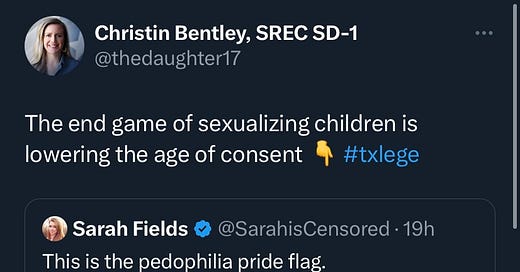


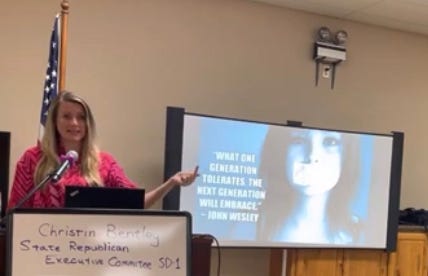

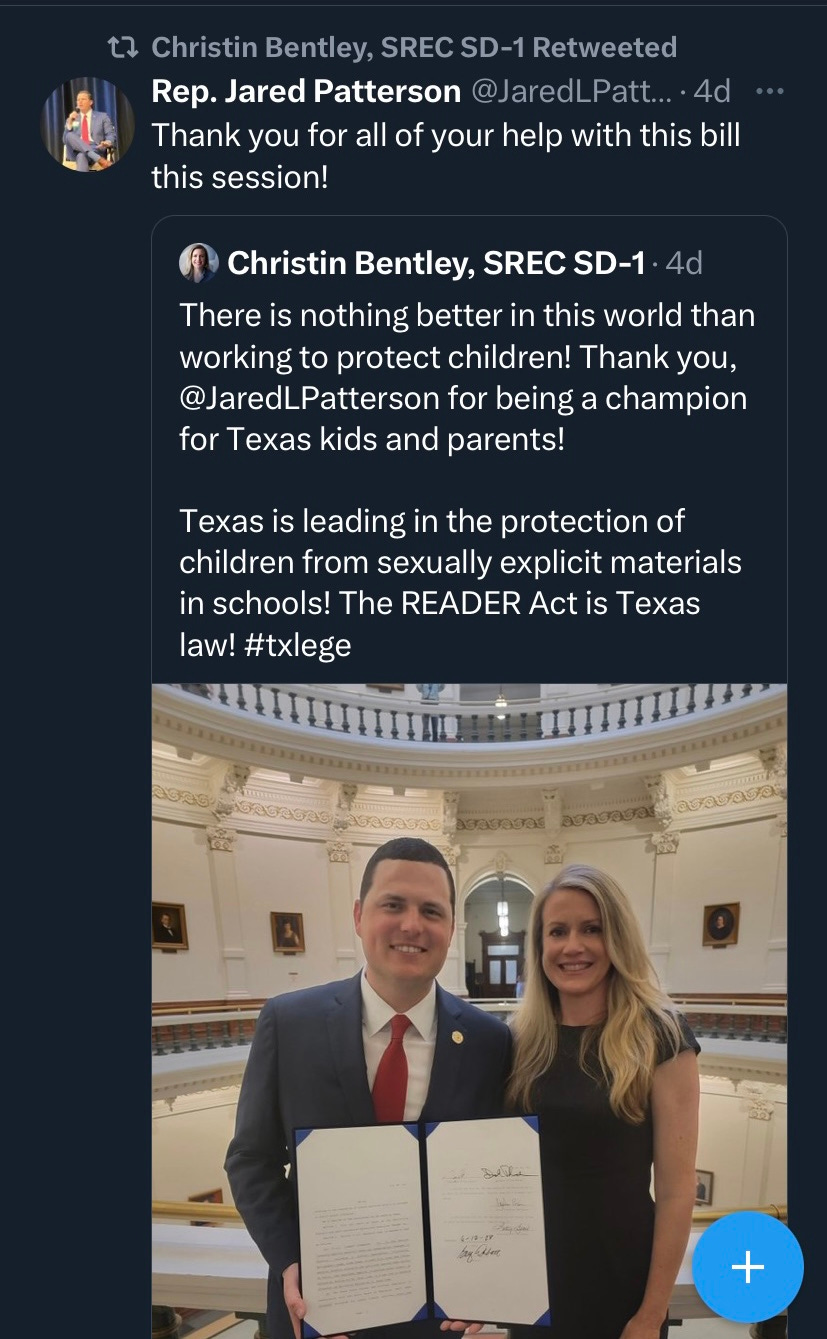
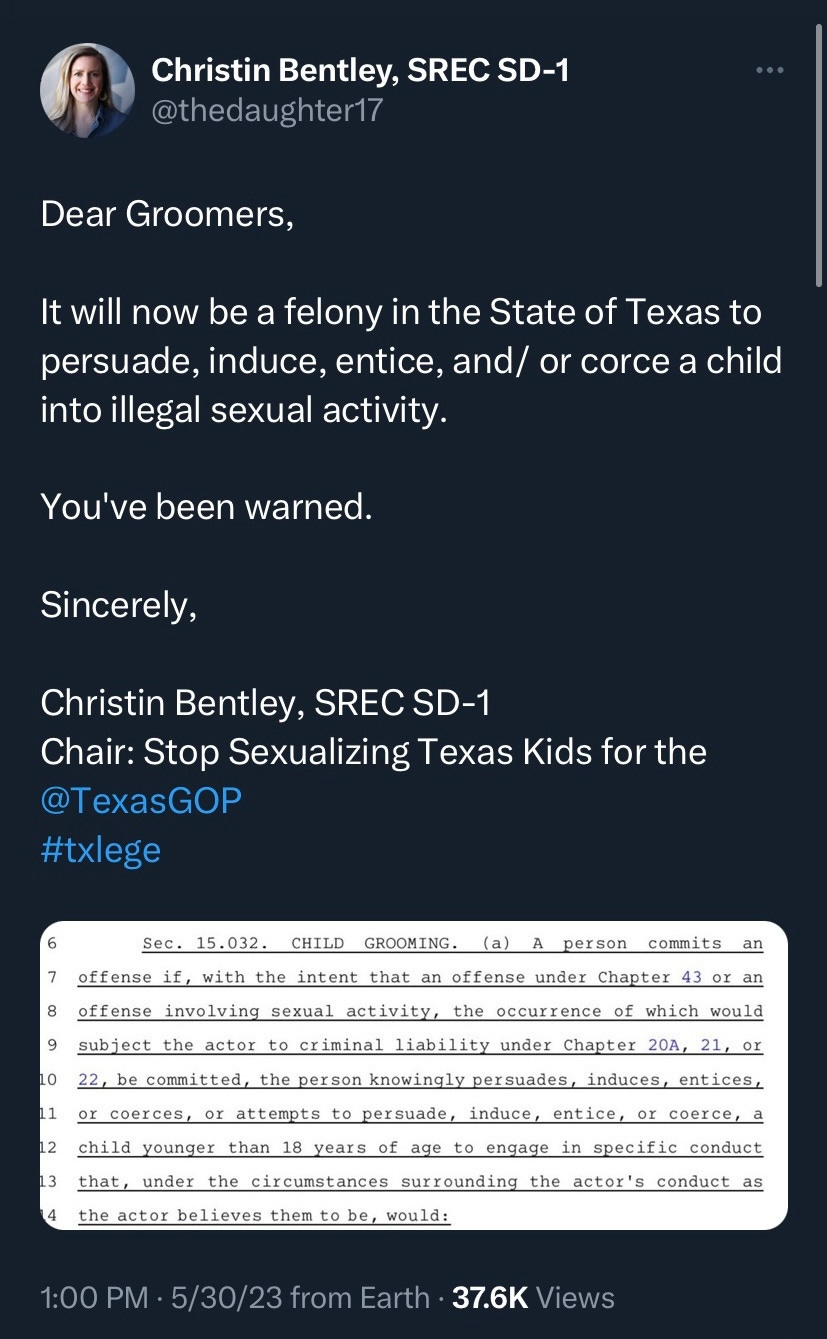
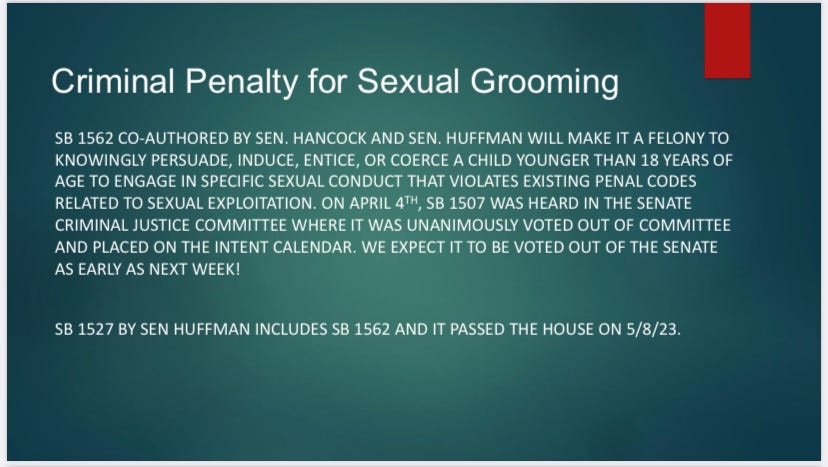
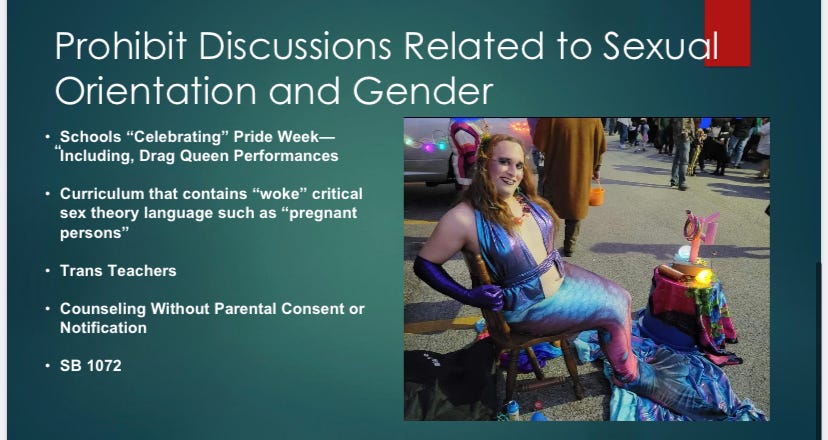
I've noticed she's stopped posting her book list in the last few weeks, I presume because her bill was passed. Thank you for staying on top of all of this. I tried for quite a while and was juggling other bills and issues that needed attention.